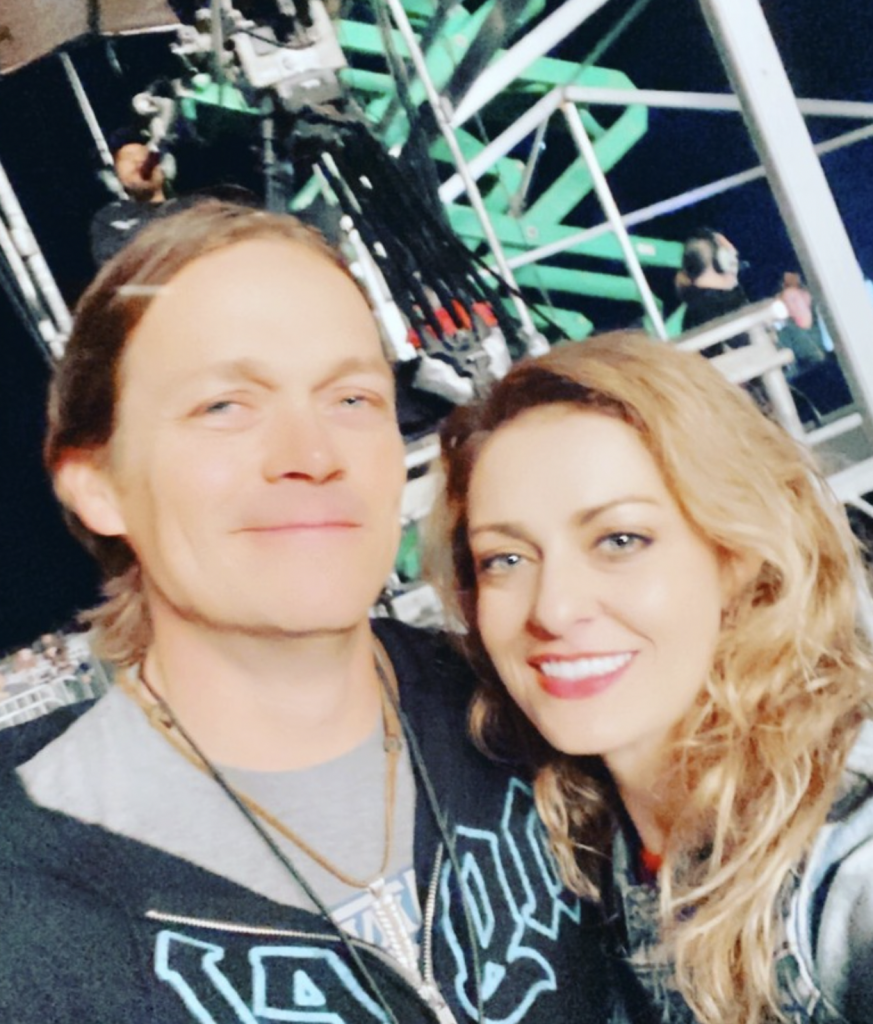Running on Faith
- 3 Doors Down singer Brad Arnold, 46, known for mega-hits such as 2000’s “Kryptonite” and “Here Without You,” has disclosed that he is battling stage 4 kidney cancer and is now placing his faith in God as he fights – and asking for some “prayer warriors” along the way.
- When faced with a health crisis such as a cancer diagnosis, it’s important to find ways to cope with the complex web of feelings you may be experiencing. Faith is one way many cancer survivors choose to cope. For some, turning to faith can be a great way to keep spirits high when cancer starts taking an emotional and/or physical toll.
- Kidney cancer develops when cells in the kidneys, a pair of bean-shaped organs each about the size of a fist, begin to grow out of control. Renal cell carcinoma is the most common type of kidney cancer. About 9 out of 10 kidney cancers are RCCs. If you are experiencing symptoms such as blood in the urine, low back pain on one side and/or extreme fatigue, do not hesitate to get in to a doctor to get checked.
The alt-rocker posted a video Wednesday on Instagram, sitting outside on a park bench wearing a grey tee and a black baseball cap, his delivery taking on a somber, yet determined, tone.
Read MoreWe serve a mighty God, and he can overcome anything.
“And it’s stage four, and that’s not really good,” the Mississippi native added. “But you know what? We serve a mighty God, and he can overcome anything. So I have no fear. I really, sincerely am not scared of it at all. But it is gonna force us to cancel our tour this summer. And we’re sorry for that.”
View this post on Instagram
In the caption alongside the clip, Arnold praised his fans and asked for their help in his “battle.”
“Thank you for all the memories so far,” he began in his caption. “Now, I believe “ITS NOT MY TIME” is really my song. This’ll be a battle so we need our prayers warriors! Thank y’all for being the best fans in the world. We love y’all!”
Arnold’s friend Gavin DeGraw wished him well, “May God bless you brother. Showing us how to conquer the darkness with your light.”
Pop icon Debbie Gibson said she was “sending love,” while fellow 80’s sensation Richard Marx also commented, “Sending you nothing but strength, healing and love brother.”

Creed lead singer Scott Stapp also comforted his friend, encouraging his faith even further.
“If anyone has the FAITH and STRENGTH to face this fight, it’s YOU brother,” the “With Arms Wide Open” songwriter shared. “You and your family are in my prayers daily🙏🏼 We can do ALL things through CHRIST. I think I can speak for all of us, we are lifting you up in prayer right now believing without doubt for your total healing!”
“I love you bro…,” Stapp added.

Ahead of sharing his personal health news, Arnold had alluded that he was going through something a couple of posts prior. Crouched down with his head down embracing his dog in front of what appeared to be a private plane, Arnold’s photo conveyed a lot of emotion. His caption confirmed something potentially heavy was weighing on him.
“Today, Tucker took his first plane flight. He don’t know how important it’ll be…….maybe I don’t either. Say a prayer for @jen_arnold @mynamestuckerthetrucker and myself in the time coming up please.”
View this post on Instagram
Though fans did not yet know what was going on, and it sounds like neither did Arnold, they commented with prayers and well wishes for whatever the rocker was going through.
“Sending good vibes to both you and Jen!” one person wrote, including his wife, Jen Arnold, a professional barrel racer.
View this post on Instagram
The couple, who reside on a horse ranch in Nashville and tend to three horses, have been married for over 15 years.
Arnold’s friend Morgan Rose, drummer for the metal band Sevendust, wrote: “Sending so much love to you and the family, my dear brother.”
‘Turning to Faith’
When faced with a health crisis such as a cancer diagnosis, it’s important to find ways to cope with the complex web of feelings you may be experiencing. Faith is one way many cancer survivors choose to cope.
In SurvivorNetTV’s original series “SN & You” episode, Turning to Faith, we follow the journeys of four women and how they turned to faith to get them through their diagnoses. For some, turning to faith can be a great way to keep spirits high when cancer starts taking an emotional and/or physical toll. One woman featured in the film is Sharon Spencer, a breast cancer survivor who was hit by a car, which left her leg partially amputated.
WATCH: ‘SN & You: Turning to Faith’
Despite everything she’s been through, Sharon still walks around with a smile on her face and an amazing outlook on life. She credits God for that positivity. Sharon was diagnosed with breast cancer when she was 39 years old. She tells us that her faith in God never faltered during all this struggle and that’s enabled her to help other women who are going through similar troubles.
“I just think there’s a purpose for each of us, and God has a plan for each of our lives,” Sharon said. “I was just designated to give the encouragement and the support that women need. I’ve gotten so much stronger and my faith has grown so much since all of these things have happened to me.”
RELATED: Famous Country Music Singer Kelly Lang, 54, Reveals ‘God Is ‘Everything’ After 17-Year Cancer Battle
Religious or not, overall, many cancer survivors find themselves with a different and more appreciative outlook on life after going through treatment. However, many medical professionals will tell you, anecdotally, that living with gratitude can make a huge difference while going through treatment as well.
“Patients who do well with cancer, they live life with that kind of gratitude,” Dr. Zuri Murrell, a colorectal cancer surgeon at Cedars-Sinai Medical Center, previously told SurvivorNet.
“They’re grateful, not for cancer, but for an opportunity to know that life is finite … they appreciate it for one of the first times ever because they know it may not be forever that they get to do this.”
Who Gets Kidney Cancer?
Kidney cancer develops when cells in the kidneys, a pair of bean-shaped organs each about the size of a fist, begin to grow out of control. Renal cell carcinoma is the most common type of kidney cancer. About 9 out of 10 kidney cancers are RCCs.
Incidences of kidney cancer are most common in older adults. The average of age of diagnosis is 64 and the majority of people diagnosed with the disease are between the ages of 65 and 74.
Lundgren was diagnosed with kidney cancer in 2015 when he was around 58 years old. It’s uncommon to be diagnosed with this disease if you’re under the age of 45.
According to the American Cancer Society (ACS), the year 2025 will see approximately 80,980 new cases of kidney cancer diagnosed, with men having nearly double the risk of kidney cancer compared to women. This type of cancer occurs more frequently in the Black population, the Native American population, and Alaskan Natives. The ACS also states that kidney cancer is among the 10 most common cancers in both men and women.

Inherited conditions can increase a person’s risk of kidney cancer. Kidney cancer affecting multiple generations of a family is called “hereditary kidney cancer.” According to Cancer.gov, hereditary kidney cancer is rare. It accounts for only 5% to 8% of all kidney cancers.
Risk factors, according to Mayo Clinic, can include:
- Older age
- Obesity
- Smoking
- High blood pressure or hypertension
Cancer.gov outlines the four hereditary syndromes associated with kidney cancer as:
- Von Hippel-Lindau disease (VHL)
- Hereditary leiomyomatosis and renal cell cancer (HLRCC)
- Birt-Hogg-Dub syndrome (BHD)
- Hereditary papillary renal cancer (HPRC)
Meanwhile, there are several tests available to determine whether you have kidney cancer. Your doctor will take into consideration a few details about your overall health when deciding the best approach.
According to the ACS, tests for kidney cancer include physical exams, blood tests, urine tests, biopsy, and imaging tests.
Kidney cancer begins in the kidneys, the ACS explains. The kidney’s primary function is to remove excess water, salt and waste from blood coming in from the renal arteries. These substances are released from the body as urine.
Treatments & Symptoms of Kidney Cancer
There are two main types of kidney cancer that occur in adults: Renal cell cancer and transitional cell cancer.
Kidney cancer can be treated with surgery, radiation, targeted therapy, immunotherapy, chemotherapy, or a combination of these different treatments. The treatment path may be dependent upon the stage of cancer at the time of diagnosis.
According to the ACS, signs and symptoms of kidney cancer can include the following:
- Blood in the urine (hematuria)
- Low back pain on one side (not caused by injury)
- A mass (lump) on the side or lower back
- Fatigue (tiredness)
- Loss of appetite
- Weight loss not caused by dieting
- Fever that is not caused by an infection and that doesn’t go away
- Anemia (low red blood cell counts)
If you have been diagnosed with late-stage kidney cancer, SurvivorNet’s clinical trial finder can help.
Learn more about SurvivorNet's rigorous medical review process.

